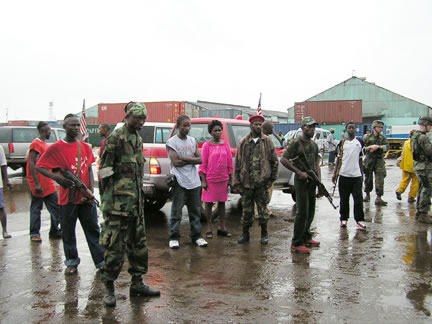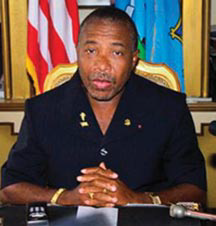|
Second Liberian Civil War
The Second Liberian Civil War was a civil war in the West African nation of Liberia that lasted from 1999 to 2003. The war was mainly caused by transition failures after the First Civil War, especially the peace-building process which would result from re-integration, disarmament, rehabilitation and demobilization. President Charles Taylor (Liberian politician), Charles Taylor came to power in 1997 after victory in the First Liberian Civil War which led to two years of peace. The Liberians United for Reconciliation and Democracy (LURD), an anti-Taylor rebel group backed by the government of Guinea, invaded northern Liberia in mid-2000, seizing the city of Voinjama. LURD made gradual gains against Taylor in the north and began approaching the capital Monrovia by early 2002. The Movement for Democracy in Liberia (MODEL), a second anti-Taylor rebel group, invaded southern Liberia in early 2003 and quickly conquered most of the south. Taylor, reduced to controlling only a third of L ... [...More Info...] [...Related Items...] OR: [Wikipedia] [Google] [Baidu] |
Rally Of Democratic Forces Of Guinea
The Rally of Democratic Forces of Guinea ( French: ''Rassemblement des forces démocratiques de Guinée'') was a minor Guinean rebel group. This group was represented in the media by a man identifying as Mohamed Lamine Fofana, but whose identity was questionable. The RFDG launched a series of attacks against Guinean government forces from its base located in Liberia on September 11, 2000. The Guinean state forces launched a counteroffensive against the RFDG and Liberian forces on September 22. Heavy fighting lasted through March 2001. An ECOWAS meeting in April 2001 was able to prevent this conflict from escalating into a full-scale war between Guinea and Liberia, and was able to end the civil war A civil war is a war between organized groups within the same Sovereign state, state (or country). The aim of one side may be to take control of the country or a region, to achieve independence for a region, or to change government policies.J ... between RFDG and the Guinean ... [...More Info...] [...Related Items...] OR: [Wikipedia] [Google] [Baidu] |
Siege Of Monrovia
The siege of Monrovia or Fourth Battle of Monrovia, which occurred in Monrovia, Liberia between July 18 and August 14, 2003, was a major military confrontation between the Armed Forces of Liberia and Liberians United for Reconciliation and Democracy (LURD) rebels during the Second Liberian Civil War. The shelling of the city resulted in the deaths of around 1,000 civilians. Thousands of people were displaced from their homes as a result of the conflict. By mid-August, after a two-month siege, Liberian president Charles Taylor went into exile and peacekeepers arrived as a result of the siege. Background In early 2003 the Movement for Democracy in Liberia (MODEL) rebel group emerged in southern Liberia. By the summer of 2003, Taylor's government controlled only a third of the country. Despite some setbacks, LURD rebels controlled the northern third of the country and was threatening the capital by mid-2003. The siege The LURD military assault against Monrovia began July 19, 2 ... [...More Info...] [...Related Items...] OR: [Wikipedia] [Google] [Baidu] |
Monrovia
Monrovia () is the administrative capital city, capital and largest city of Liberia. Founded in 1822, it is located on Cape Mesurado on the Atlantic Ocean, Atlantic coast and as of the 2022 census had 1,761,032 residents, home to 33.5% of Liberia’s total population. Its largely urbanized metro area, including Montserrado County, Montserrado and Margibi County, Margibi Counties of Liberia, counties, was home to 2,225,911 inhabitants as of the 2022 census. As the nation's primate city, primary city, Monrovia is the country's economic, financial and cultural center; its economy is primarily centered on its harbor and its role as the seat of Liberian government. The city's economy is largely based on its position as chief List of ports and harbours of the Atlantic Ocean, Atlantic port of Liberia, with the Freeport of Monrovia based in the city being the largest and main port in the country. The city was traditionally the land of the Vai people, Vai People, a West Africa, West Af ... [...More Info...] [...Related Items...] OR: [Wikipedia] [Google] [Baidu] |
First Liberian Civil War
The First Liberian Civil War was the first of Second Liberian Civil War, two civil wars within the West African nation of Liberia which lasted between 1989 and 1997. President Samuel Doe's regime of totalitarianism and widespread Political corruption, corruption led to calls for withdrawal of the support of the United States, by the late 1980s. The National Patriotic Front of Liberia (NPFL) led by Charles Taylor (Liberian politician), Charles Taylor invaded Liberia from the Ivory Coast to overthrow Doe in December 1989 and gained control over most of the country within a year. Doe was captured and executed by the Independent National Patriotic Front of Liberia (INPFL), a splinter faction of the NPFL led by Prince Johnson, in September 1990. The NPFL and INPFL fought each other for control of the capital city, Monrovia and against the Armed Forces of Liberia and pro-Doe United Liberation Movement of Liberia for Democracy. Peace negotiations and foreign involvement led to a ceasef ... [...More Info...] [...Related Items...] OR: [Wikipedia] [Google] [Baidu] |
Lansana Conté
Lansana Conté (; 30 November 1934 – 22 December 2008"Guinea's long-time military leader Conte dies" AFP, 23 December 2008.) was a Guinean politician and Officer (armed forces), military officer who served as the second president of Guinea from 1984 until his death in 2008. Conté came to power in the 1984 Guinean coup d'état. Early life Born in Moussayah Loumbaya (Dubréka), a member of the Susu people, Susu ethnic group,Hodonou, Valentin (2004) "Guinea-Conakry Adrift" ''African Geopolitics'' No ...[...More Info...] [...Related Items...] OR: [Wikipedia] [Google] [Baidu] |
Thomas Nimely
Thomas Yaya Nimely (born 1956) is a Liberian politician and former rebel leader who has served as a senator for Grand Gedeh County since 2024. During the Second Liberian Civil War, Nimely founded the Movement for Democracy in Liberia (MODEL) rebel group in opposition to president Charles Taylor. Following Taylor's overthrow in 2003, he served as foreign minister between 2005 and 2006 in the government of Ellen Johnson Sirleaf. He was elected to the Senate of Liberia during the 2023 Liberian general election as a member of the Liberia Restoration Party (LRP). Career In 2003 he became the leader of the Movement for Democracy in Liberia (MODEL), which soon became Liberia's second largest rebel group. Following the exile of President Charles Taylor, Nimely led his group into the transitional government which was formed on 14 October 2003. He then served as the foreign minister of Liberia until February 2006, when the elected President Ellen Johnson Sirleaf took office and esta ... [...More Info...] [...Related Items...] OR: [Wikipedia] [Google] [Baidu] |
Sekou Conneh
Sekou Damate Conneh, Jr. (born 1960) is a Liberian politician and former rebel leader. Biography Born in 1960 in the town of Gbarnga, Liberia ( Bong County) to an ethnic Mandingo Muslim family, Conneh attended St. Martin's Cathedral School from 1966 to 1973. He attended William Tubman Methodist High School where he received his diploma in 1979. He first became active in politics in 1980 when he joined the opposition Progressive People's Party; this was formed as one of the first legally recognized opposition parties in Liberia in more than 100 years. Ethnic indigenous groups in Liberia, who comprise some 95% of the population in the 21st century, had grown impatient with restrictions and lack of power under governments dominated by the True Whig Party, whose leaders were primarily Americo-Liberians, an ethnic group descended from African-American colonists of the early and mid-19th century. Conneh had been a member of the Progressive Alliance of Liberia (PAL), the PPP's mot ... [...More Info...] [...Related Items...] OR: [Wikipedia] [Google] [Baidu] |
Gyude Bryant
Charles Gyude Bryant (17 January 1949 – 16 April 2014) was a Liberian politician and businessman. He served as the Chairman of the Transitional Government of Liberia from 14 October 2003 to 16 January 2006. The installation of the transitional government was part of the peace agreement to end the country's second civil war, which had raged since the Liberians United for Reconciliation and Democracy (LURD) rebelled against President Charles Taylor in 1999. Bryant was previously a businessman and was chosen as chairman because he was seen as politically neutral and therefore acceptable to each of the warring factions, which included LURD, the Movement for Democracy in Liberia (MODEL), and loyalists of former President Taylor. He was a prominent member of the Episcopal Church of Liberia, and was critical of the governments of Samuel Doe (1980–90) and Taylor (1997–2003). Ellen Johnson Sirleaf won the 2005 elections and took office in January 2006, succeeding Bryant. He ... [...More Info...] [...Related Items...] OR: [Wikipedia] [Google] [Baidu] |
Sam Bockarie
Samuel Sam Bockarie (2 October 1964 – 5 May 2003), widely known as Mosquito, was a Sierra Leonean politician and army commander who served as a leader of the Revolutionary United Front (RUF). Bockarie was infamous during the Sierra Leone Civil War for his brutal tactics, which included amputation, mutilation, and rape. He earned the nickname "Mosquito" for his ability to attack when his enemies were off-guard, mainly during the night. In the book ''Merchant of Death'', the author states the nickname came from Bockarie's claims that he would "suck the life out of his enemies." During his service in the RUF, he befriended future Liberian president Charles Taylor, and RUF commander Foday Sankoh. When Sankoh was imprisoned from March 1997 until April 1999, Bockarie served as commander of the RUF in his place. Youth Sam Bockarie was born on 2 October 1964 in Koidu Town, Kono District in the Eastern Province of Sierra Leone. Bockarie was the son of a diamond miner and he was r ... [...More Info...] [...Related Items...] OR: [Wikipedia] [Google] [Baidu] |
Charles McArther Emmanuel
Charles McArther Emmanuel (born February 12, 1978), also known as Chuckie Taylor, is an American-Liberian former soldier and war criminal. He is the son of Charles Taylor, the former President of Liberia.Ex-prisoner: Taylor's son laughed at torture ." '' CNN''. September 30, 2008. Raised by his mother in the U.S. until he was 16, Taylor Jr. traveled to in 1994 to live with his father. During his father's presidency, he became the commander of the infamously violent [...More Info...] [...Related Items...] OR: [Wikipedia] [Google] [Baidu] |
Benjamin Yeaten
Benjamin Yeaten (born 28 February 1969), widely known by his old radio call sign "50", is a Liberian militia leader and mercenary, who served as the Armed Forces of Liberia's deputy commander and director of the Special Security Service (SSS) during the presidency of Charles Taylor. Notorious for committing several war crimes, Yeaten was one of Taylor's most trusted and loyal followers. He rose to the ''de facto'' leader of all of Taylor's armed forces and the second most powerful figure in the government during the Second Liberian Civil War. After the fall of Taylor's regime, he managed to flee his home country, and since then operates covertly in West Africa as commander, recruiter, and military adviser for hire. Biography Service under Charles Taylor Early life and rise in ranks Benjamin Yeaten was born on 28 February 1969 in Tiaplay, Nimba County, Liberia, which was one of the areas in Liberia that suffered the most under Samuel Doe's regime. As result, Yeaten joine ... [...More Info...] [...Related Items...] OR: [Wikipedia] [Google] [Baidu] |




